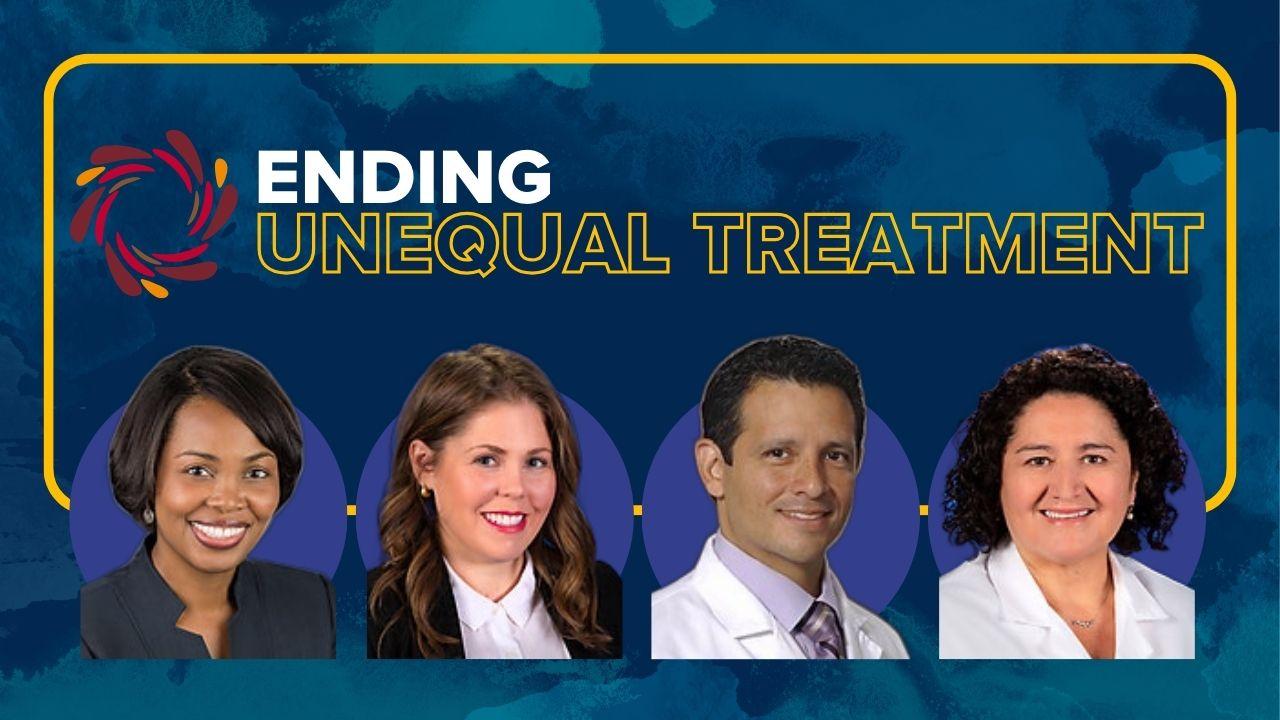
UC Davis Experts Reflect on Two Decades of Health Equity
Not enough progress has been made nationally in the past 20 years to address health equity, according to a panel of UC Davis School of Medicine experts who recently presented at a virtual event hosted by the UC Davis Campus Community Book Project.
The panel of experts explored the findings of the newly released "Ending Unequal Treatment: Strategies to Achieve Equitable Health Care and Optimal Health for All" report from the National Academies of Sciences, Engineering, and Medicine. The overarching focus of this virtual event—health equity and justice—is the theme of this year’s Campus Community Book Project.
At the Ending Unequal Treatment virtual event, the panel discussed how systemic inequities in healthcare continue to affect communities of color, while also emphasizing innovative strategies—both nationally and locally—that aim to reduce disparities. They also examined what has changed since the 2003 version of the report sounded the alarm on pervasive racial and ethnic disparities in healthcare.
“This was one of the most impactful reports in history,” said Ruth Shim, M.D., M.P.H., the Luke and Grace Kim Professor in Cultural Psychiatry. “It sparked careers and served as a foundational text for understanding health disparities. But while progress has been made, systemic inequities remain deeply rooted.”
A Look Back: How Much Progress Has Been Made?
Dr. Shim and another panelist, Carolina Reyes, M.D., served on the committees that developed both the original Unequal Treatment report and this updated publication. Dr. Reyes, associate clinical professor and specialist in maternal-fetal medicine, added historical context, recalling the resistance the 2003 report faced.
“We thought the original report would revolutionize the field, but it met with backlash,” she said. “It took decades of legislation and advocacy to move the needle, and more recent events like George Floyd’s murder finally galvanized broader awareness.”
Data, Diversity and Complexity
A key theme of the discussion was the complexity of categorizing race and ethnicity in medical research. Alice Popejoy, Ph.D., assistant professor in residence in public health sciences, highlighted the tension between the flaws in historic categorizations and their utility.
“The way we classify people in medicine has limitations, but it’s also critical for ensuring we have longitudinal data to track disparities,” she said. “The challenge is collecting this data in ways that respect individuals’ identities while capturing the nuance of intersectionality.”
Dr. Shim agreed, emphasizing that “racial classification is inherently subjective because race is a social construct. But eliminating race from data entirely would hide the disparities we need to address for improving care, especially for those from historically underserved communities.”
Engaging Communities for Sustainable Solutions
Erik Fernandez y Garcia, M.D., M.P.H., a professor focused on community-centered interventions for health inequities, stressed the importance of community engagement in addressing social determinants of health when trying to combat disparities in health care.
“Communities are the true experts on the environmental and social factors affecting their health,” he said. “To create sustainable change, we must readdress power imbalances and involve communities in designing and delivering care.”
Dr. Reyes added, “One of the most promising interventions is training providers to ask open-ended questions, allowing patients to share their experiences in their own words. It’s a simple but powerful way to ensure care is patient-centered and culturally competent.”
Local Strategies for Change
In addition to national challenges, the panel focused on UC Davis-led efforts to advance health equity. Dr. Shim discussed initiatives addressing inequities through research, community engagement, and workforce development. For example, UC Davis is leading programs to diversify the healthcare workforce, enhance access to culturally competent care, and design community partnerships that prioritize health equity.
“Real change happens when we bring together science, community, and advocacy,” Shim said. “Locally, we need to restrengthen our commitment to addressing inequities by prioritizing out connections to the communities we serve.”
Hope for the Future
The Ending Unequal Treatment report lays out strategies for eliminating health inequities, including policy reforms, investment in underserved communities, and systemic changes to healthcare delivery. While there is still much work to be done, the panelists expressed optimism for the future and underscored the importance of collaboration and innovation in the fight for equitable care.
“Dr. Martin Luther King Jr. said, ‘The arc of the moral universe is long,’” said Dr. Shim. “It will take energy and commitment over the next 20 years, but we are making progress.”
Media Resources
Sarah Colwell is a freelance writer and marketing strategist who specializes in serving higher education clients.
